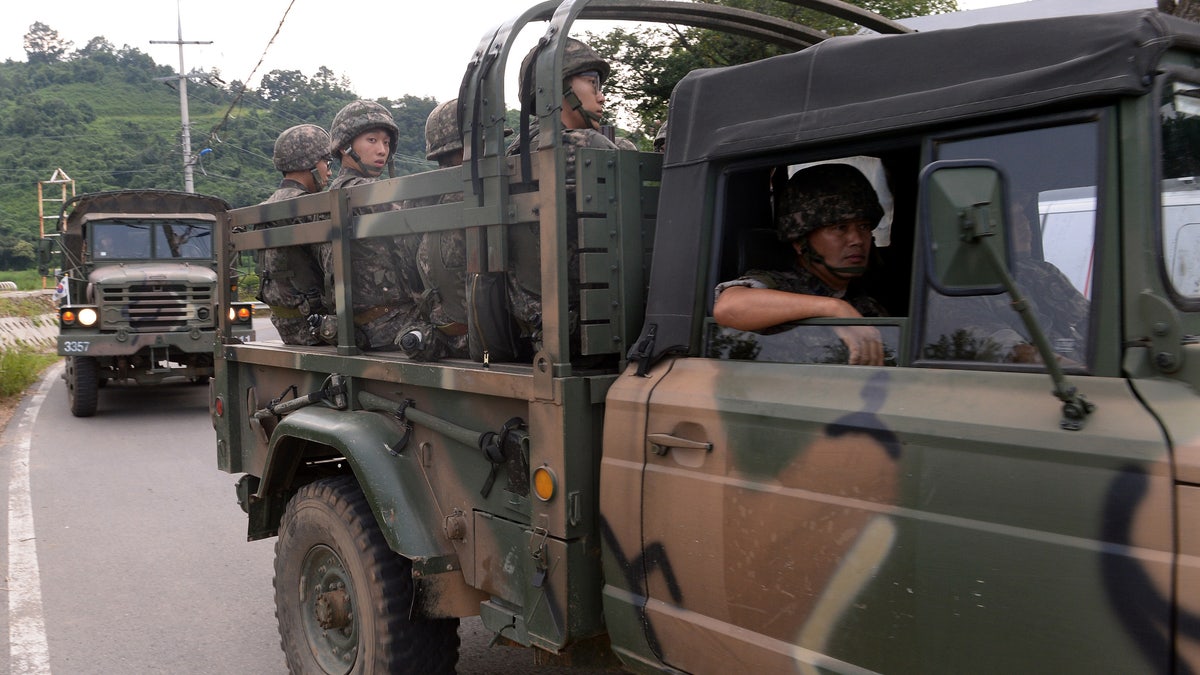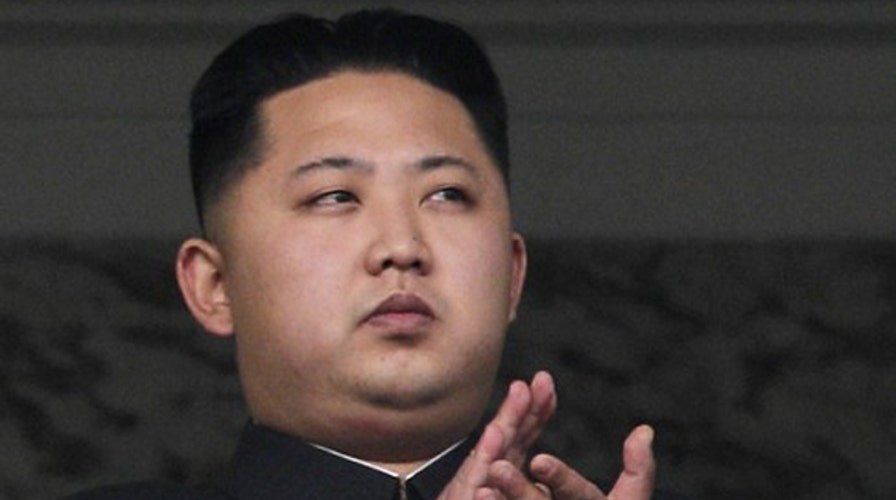Is Kim Jong Un trying to restart the Korean War?
Dr. Bruce Bennett and Bruce Klingner on what's provoking increased tension
North Korean leader Kim Jong Un declared his front-line troops were in a "quasi-state of war" Friday and ordered them to prepare for battle, a day after the most serious confrontation with South Korea in years.
A North Korean military official says a meeting of senior party and defense officials led by North Korean leader Kim Jong Un met Thursday night and "reviewed and approved the final attack operation."
He gave no details on what kind of military retaliation North Korea would see as appropriate punishment for South Korea's shelling of its territory Thursday.
It’s the latest challenge in the regional feud. South Korea warned Friday that North Korea was likely to launch "provocations" if Seoul did not meet a Saturday deadline to cease propaganda broadcasts.
Kim Yong Chol, director of the general reconnaissance bureau of the North Korean army, on Friday denied South Korean allegations that Pyongyang has been raising tensions on the peninsula.
He denied the North fired anything across the Demilitarized Zone and says South Korea has not offered conclusive evidence where the rocket was launched in the North, or where exactly it landed in the South.
He suggested human error might have been a factor on the South Korean side and says the South's decision to retaliate with its own barrage was dangerous and rash.
Kim says: "Skirmishes can lead to all-out war."
South Korean Defense Minister Han Min-koo issued a warning at a press conference as a South Korean media outlet reported that Pyongyang appeared to be preparing to test-fire short- and mid-range ballistic missiles.
The report by Yonhap News Agency cited a South Korean government source who said that North Korea seemed to be "weighing the timing of the firing under its strategic intention to increase military tension on the Korean Peninsula to the highest level." The source also said that the apparent preparations for the test had been detected by South Korea's joint radar system, which it shares with the United States.
The North has given Seoul a deadline of 5 p.m. Saturday evening (4 a.m. EDT) to remove border loudspeakers that—after an 11 year lull-- have started broadcasting anti-Pyongyang propaganda. Failure, Pyongyang says, will result in further military action. Seoul has vowed to continue the broadcasts.
Earlier Friday, North Korean leader Kim Jong-un declared his country to be in a "quasi-state of war" and fully ready for any military operations starting Friday evening, according to a report by Pyongyang's official Korean Central News Agency.
In response, South Korea raised its military readiness to its highest level. Joint Chiefs of Staff spokesman Jeon Ha-kyu told a televised news conference that South Korea is ready to repel any additional provocation.

Aug. 21, 2015 - South Korean army soldiers ride on a truck in Yeoncheon, south of the demilitarized zone that divides the two Koreas. North Korean leader Kim Jong Un on Friday declared his frontline troops in a "quasi-state of war" and ordered them to prepare for battle. (AP)
The rivals are at odds over annual U.S.-South Korean military drills that North Korea calls an invasion rehearsal. Seoul and Washington say the drills are defensive in nature.
U.S. defense officials said Friday that an annual military exercise with South Korea has been halted.
"It's a pre-scheduled pause," Reuters reported an official said on condition of anonymity, adding that it was "common practice" to stop such long exercises temporarily to assess lessons learned.
The officials say the U.S. is monitoring the situation, but hasn't taken any other military steps. It’s unclear if the exercise will resume. The annual exercise began Monday and was slated to end next Friday.
Meanwhile, the North's media report said that "military commanders were urgently dispatched for operations to attack South Korean psychological warfare facilities if the South doesn't stop operating them." South Korea's vice defense minister said Friday this likely meant the North would fire on the 11 sites where South Korea had set up loudspeakers to broadcast propaganda.
The loudspeaker broadcasts began after South Korea accused the North of planting land mines that maimed two South Korean soldiers earlier this month. One of the injured soldiers lost both legs and the other one leg. North Korea denies the South's accusation and demanded video proof.
The North's declaration Friday is similar to its other warlike rhetoric in recent years, including repeated threats to reduce Seoul to a "sea of fire," and the huge numbers of soldiers and military equipment already stationed along the border mean the area is always essentially in a "quasi-state of war." Still, the North's apparent willingness to test Seoul with military strikes and its recent warning of further action raise worries because South Korea has vowed to hit back with overwhelming strength should North Korea attack again.
The North's capital of Pyongyang was mostly business as usual Friday morning, although propaganda vans with loudspeakers broadcast the state media line that the country was in a "quasi-state of war" to people in the streets.
North Korea on Thursday afternoon first fired a single round believed to be from an anti-aircraft gun, which landed near a South Korean border town, Seoul said. About 20 minutes later, three North Korean artillery shells fell on the southern side of the Demilitarized Zone dividing the two Koreas. South Korea responded with dozens of 155-millimeter artillery rounds, according to South Korean defense officials.
North Korea said the South Korean shells landed near four military posts but caused no injuries. No one was reported injured in the South, either, though hundreds were evacuated from frontline towns.
On Friday, about 60 residents in the South Korean town near where the shell fell, Yeoncheon, were still in underground bunkers, Yeoncheon officials said. Yonhap reported that a total of about 2,000 residents along the border were evacuated Thursday.
Escalation is a risk in any military exchange between the Koreas because after two attacks blamed on Pyongyang killed 50 South Koreans in 2010, South Korea's military warned that any future North Korean attack could trigger strikes by South Korea that are three times as large.
The Koreas' mine-strewn DMZ is a legacy of the 1950-53 Korean War, which ended with an armistice, not a peace treaty, leaving the Korean Peninsula still technically in a state of war. About 28,500 U.S. soldiers are deployed in South Korea to deter potential aggression from North Korea.
The Associated Press contributed to this report.

